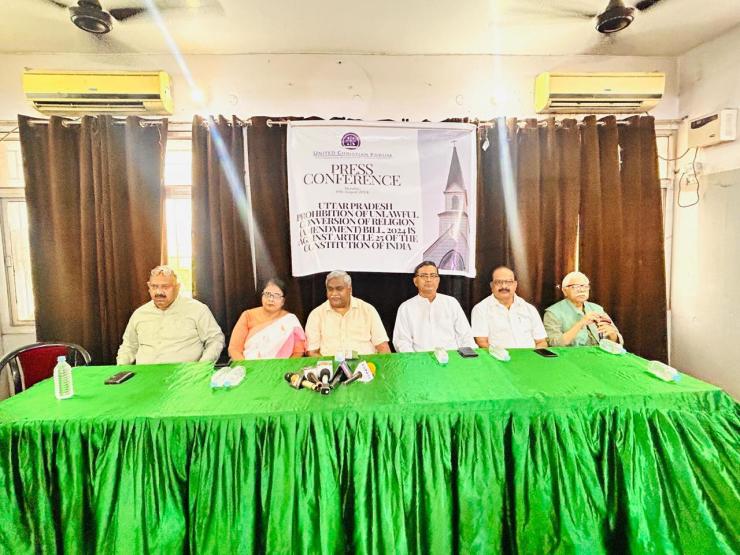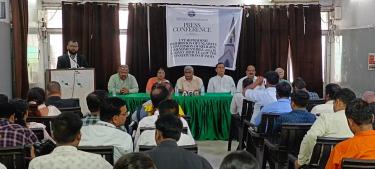
The United Christian Forum (UCF), a Christian watchdog group based out of Delhi, has submitted a memorandum to the Governor of Uttar Pradesh in Lucknow, Anandiben Patel, expressing serious concerns about the Uttar Pradesh Prohibition of Unlawful Conversion of Religion (Amendment) Bill, 2024. The organisation warned that the proposed legislation, which aims to tighten measures against fraudulent or forced religious conversions, could lead to increased harassment and violence against religious minorities.
A delegation including several pastors from Lucknow visited Raj Bhawan – the residence of the Governor, on 19 August but were not able to meet her. They handed the memorandum to an official to be passed on to her.
“We couldn’t meet the Governor due to an impending festival of Raksha Bandhan,” said A C Michael, National Coordinator of UCF, who was also part of the delegation to Christian Today. “We were met by an authorised senior official of Raj Bhawan who heard our grievances patiently and assured to reach our memorandum to Governor Madam as soon as the office opens,” said Michael.
In the memorandum dated 19 August 2024, the UCF highlights several issues with the existing anti-conversion law and its proposed amendment. They argued that the broad and ambiguous language of the bill emboldens individuals and extremist groups to target religious minorities under the guise of preventing fraudulent conversions.
One of the primary concerns raised is the provision allowing "any person" to lodge a complaint, which the UCF claim opens door to accusations driven by personal, political, or communal biases. The organisation cited a report by Article 14, a legal research group, which analysed over 100 First Information Reports (FIRs) filed under the anti-conversion law in Uttar Pradesh. The analysis revealed that 63 of these cases were registered based on third-party complaints, with 26 coming from extremist groups.
The memorandum also pointed out the vague nature of terms used in the law, such as "force, fraud, and allurement". The UCF argued that these undefined terms lead to the demonisation of innocent gatherings, citing instances where birthday celebrations and prayer meetings have been misconstrued as attempts at forceful conversion.
Several case studies were included in the memorandum to illustrate the misuse of the existing law. In one incident from November 2023, 22 individuals were arrested in Sonbhadra district, with a total of 42 people implicated in a single FIR. The complainant's affiliation with a fundamentalist group raises questions about the motives behind the accusations.
Another case from July 2022 saw six Dalit women arrested in Azamgarh while celebrating a child's birthday. Local extremists reported the gathering as an event where forced conversion was allegedly taking place, resulting in charges under the anti-conversion act.
The UCF expressed particular concern about police complicity and failure to verify the veracity of incidents before making arrests. They argued that existing criminal laws already address fraud, coercion, or force, making the additional penalties imposed by the anti-conversion law disproportionate and unnecessary.
The memorandum cited researchers who have documented how anti-conversion laws have been weaponised to target religious minorities. False cases often linger for years, subjecting the accused to police and mob brutality, as well as mounting legal costs. The UCF argues that this results in undue violation of the right to life and liberty.
One particularly troubling case highlighted in the memorandum involves a pregnant woman and her one-year-old daughter who were taken into custody in September 2023. The incident occurred when a prayer meeting in Azamgarh was interrupted by a neighbour's false accusation of religious conversion.

The UCF also drew attention to instances where FIRs have been filed against deceased individuals or where complainants have later admitted to being coerced into making false accusations. These cases, they argue, demonstrate the potential for abuse inherent in the current law and its proposed amendment.
To address these concerns, the UCF has put forward several recommendations. Primarily, they called for the repeal of the existing Uttar Pradesh Prohibition of Unlawful Conversion of Religion Act, 2021, citing its extensive misuse and detrimental impact on religious minorities. They also urged the suspension of the 2024 Amendment Bill in its current form, warning that its provisions are likely to intensify the risk of false accusations and violence.
Other recommendations include strengthening training for police and judicial officers to safeguard religious freedoms and conduct unbiased investigations. The UCF also called for the establishment of support systems for individuals wrongfully accused, including legal assistance and psychological counselling.
The memorandum emphasises the need for initiatives that strengthen community relations and promote tolerance among different religious groups. It suggests that the government should prioritise public awareness campaigns to educate citizens about constitutional rights related to religious freedom and the importance of respecting diversity.
The handing over the memorandum was followed by a press conference “addressed by representatives of Hindu, Muslim and Christian communities,” said Michael.
The National Council of Churches in India (NCCI) last month (31 July) issued a strong condemnation against the government’s move and objecting to the multifaceted law, they highlighted several crucial aspects of civil liberties and religious freedom.




